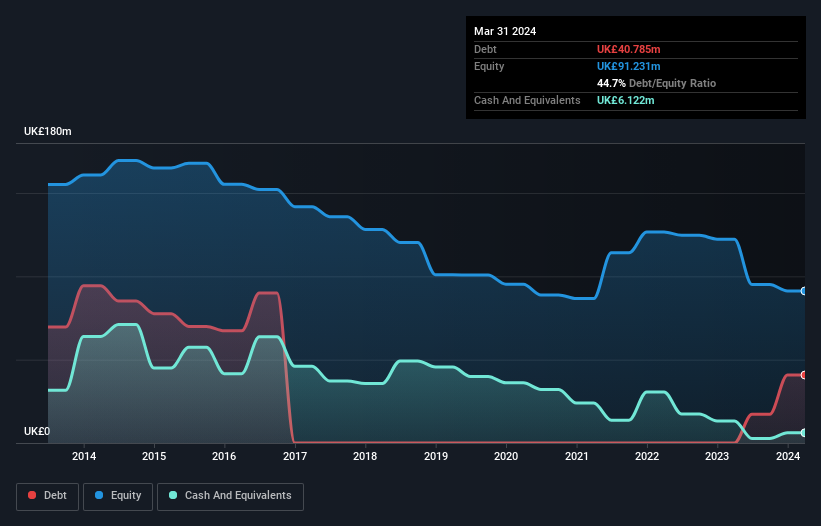Legendary fund manager Li Lu (who Charlie Munger backed) once said, 'The biggest investment risk is not the volatility of prices, but whether you will suffer a permanent loss of capital.' It's only natural to consider a company's balance sheet when you examine how risky it is, since debt is often involved when a business collapses. As with many other companies The Conygar Investment Company PLC (LON:CIC) makes use of debt. But the real question is whether this debt is making the company risky.
Why Does Debt Bring Risk?
Debt and other liabilities become risky for a business when it cannot easily fulfill those obligations, either with free cash flow or by raising capital at an attractive price. In the worst case scenario, a company can go bankrupt if it cannot pay its creditors. While that is not too common, we often do see indebted companies permanently diluting shareholders because lenders force them to raise capital at a distressed price. Of course, debt can be an important tool in businesses, particularly capital heavy businesses. When we examine debt levels, we first consider both cash and debt levels, together.
Check out our latest analysis for Conygar Investment
What Is Conygar Investment's Net Debt?
As you can see below, at the end of March 2024, Conygar Investment had UK£40.8m of debt, up from none a year ago. Click the image for more detail. However, it does have UK£6.12m in cash offsetting this, leading to net debt of about UK£34.7m.

A Look At Conygar Investment's Liabilities
According to the last reported balance sheet, Conygar Investment had liabilities of UK£3.21m due within 12 months, and liabilities of UK£45.4m due beyond 12 months. Offsetting this, it had UK£6.12m in cash and UK£1.05m in receivables that were due within 12 months. So its liabilities outweigh the sum of its cash and (near-term) receivables by UK£41.5m.
This deficit is considerable relative to its market capitalization of UK£51.6m, so it does suggest shareholders should keep an eye on Conygar Investment's use of debt. This suggests shareholders would be heavily diluted if the company needed to shore up its balance sheet in a hurry. The balance sheet is clearly the area to focus on when you are analysing debt. But it is Conygar Investment's earnings that will influence how the balance sheet holds up in the future. So if you're keen to discover more about its earnings, it might be worth checking out this graph of its long term earnings trend.
Given it has no significant operating revenue at the moment, shareholders will be hoping Conygar Investment can make progress and gain better traction for the business, before it runs low on cash.
Caveat Emptor
Not only did Conygar Investment's revenue slip over the last twelve months, but it also produced negative earnings before interest and tax (EBIT). Indeed, it lost a very considerable UK£11m at the EBIT level. Considering that alongside the liabilities mentioned above does not give us much confidence that company should be using so much debt. Quite frankly we think the balance sheet is far from match-fit, although it could be improved with time. However, it doesn't help that it burned through UK£7.6m of cash over the last year. So in short it's a really risky stock. When analysing debt levels, the balance sheet is the obvious place to start. However, not all investment risk resides within the balance sheet - far from it. For instance, we've identified 2 warning signs for Conygar Investment (1 makes us a bit uncomfortable) you should be aware of.
If you're interested in investing in businesses that can grow profits without the burden of debt, then check out this free list of growing businesses that have net cash on the balance sheet.
New: AI Stock Screener & Alerts
Our new AI Stock Screener scans the market every day to uncover opportunities.
• Dividend Powerhouses (3%+ Yield)
• Undervalued Small Caps with Insider Buying
• High growth Tech and AI Companies
Or build your own from over 50 metrics.
Have feedback on this article? Concerned about the content? Get in touch with us directly. Alternatively, email editorial-team (at) simplywallst.com.
This article by Simply Wall St is general in nature. We provide commentary based on historical data and analyst forecasts only using an unbiased methodology and our articles are not intended to be financial advice. It does not constitute a recommendation to buy or sell any stock, and does not take account of your objectives, or your financial situation. We aim to bring you long-term focused analysis driven by fundamental data. Note that our analysis may not factor in the latest price-sensitive company announcements or qualitative material. Simply Wall St has no position in any stocks mentioned.
About AIM:CIC
Conygar Investment
The Conygar Investment Company PLC ("Conygar") is an AIM quoted property investment and development group dealing in UK property.
Mediocre balance sheet with low risk.
Market Insights
Community Narratives



